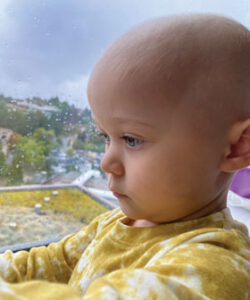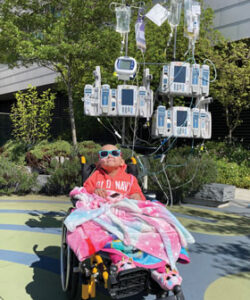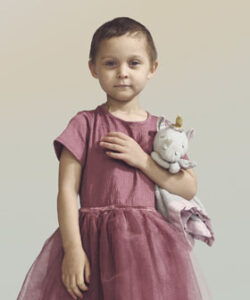Getting personal: The promise of precision medicine
Rylie, age 4
“The biology behind each child’s tumour is different. That’s the mystery that research helps to solve.” —Dr. Rod Rassekh
When Toni saw five medical experts walk into the room to present test results for her young daughter Rylie, she had a sinking feeling that the news would change her family’s lives forever. She was right—Rylie had cancer.
 It had started with a mysterious limp when Rylie was just short of 3 years old in the summer of 2021. Normally an energetic and active child, she was struggling to put any weight on her leg, so her family took her to a hospital near their home in the Okanagan.
It had started with a mysterious limp when Rylie was just short of 3 years old in the summer of 2021. Normally an energetic and active child, she was struggling to put any weight on her leg, so her family took her to a hospital near their home in the Okanagan.
After numerous tests, the medical team gave Toni the devastating news that Rylie’s limp was caused by cancer spreading through her legs.
“We were in disbelief. In that moment, our whole world stopped,” Toni said.
Rylie was immediately transported to BC Children’s Hospital, where she was diagnosed with stage four metastatic neuroblastoma—a rare, high-risk form of cancer.
The Power of Precision
The family met with Dr. Rod Rassekh: oncologist and investigator, Michael Cuccione Childhood Cancer Research Program at BC Children’s Hospital. As Dr. Rassekh and his team explained the hospital’s progress in tackling rare and aggressive forms of cancer, they gave Toni a ray of hope.
“Over the past decade, remarkable gains have been made in many areas of pediatric cancer care,” Dr. Rassekh said. “Some kids are surviving cancers once thought to be incurable.”
This is in large part because of the strides made in bringing safer, more personalized treatments to kids—an area called precision medicine.
Through genetic sequencing, medical experts are creating treatment plans based on a child’s unique genes, as well as the genetic profile of the cancer. In other words: scouring for the nuances in each child’s cancer to pinpoint the Achilles heel that could result in a cure.
“The biology behind each child’s tumour is different,” Dr. Rassekh explained. “That’s the mystery that research helps to solve. It answers the question: how do we best treat Rylie’s tumour?”
But that isn’t all.
 For kids like Rylie, some treatments can be accompanied by a significant chance of devastating side effects, including heart damage and hearing loss—worries that keep Toni up at night. Research is key in determining whether a child’s unique genetic makeup may result in complications, allowing them to develop a treatment plan that ensures a healthy life for decades to come.
For kids like Rylie, some treatments can be accompanied by a significant chance of devastating side effects, including heart damage and hearing loss—worries that keep Toni up at night. Research is key in determining whether a child’s unique genetic makeup may result in complications, allowing them to develop a treatment plan that ensures a healthy life for decades to come.
The promise of this work has never been greater. “We’ve built such incredible momentum,” Dr. Rassekh said. “The incremental speed of research is getting faster and faster—and we’re bringing advances to the clinic more rapidly than we’ve ever been able to.”
Taking a targeted approach
Guided by the principles of precision medicine, Dr. Rassekh and his team took knowledge gained from treatments applied to children in the past with rare cancers and combined it with an in-depth analysis of Rylie’s neuroblastoma to craft a personalized treatment plan. This gave Rylie the best possible chance to overcome the cancer, while minimizing the risk of side effects.
Rylie required 18 months of intense care at BC Children’s. In the first of many gut-wrenching decisions, Toni decided to stay in the hospital with Rylie while her husband remained in the Okanagan with Rylie’s older brother, Cameron.
The treatment plan was daunting: high-dose radiation therapy and two stem cell transplants, with high dose chemotherapy and immunotherapy.
“You feel like you’re torturing your kid when you’re doing the best for her, but she doesn’t understand everything,” Toni said. “As a parent, that was one of the most difficult things.”
During the 18 months of treatment, Rylie’s journey took many turns. The medicines inflicted a toll on her body, causing damage to many of her organs including her kidneys, liver and lungs. The treatment also affected her growth—Rylie is about the size of a large 2-year-old, even though she’ll be turning 5 this summer.
Small as she is, Rylie refuses to let anything get in her way. She has a big, sassy personality, loves to sing and easily makes friends. Despite all she’s been through—or maybe because of it—Rylie is very loving and supportive of others. “She’s mighty in every sense of the word,” Toni said proudly.
On the road to recovery
 Rylie completed her last cancer treatment in December 2022, and a recent scan provided incredible news—no traces of cancer in her body. The first thing Rylie wanted to do
Rylie completed her last cancer treatment in December 2022, and a recent scan provided incredible news—no traces of cancer in her body. The first thing Rylie wanted to do
when she heard this was relax in a hot tub, one of her favourite things and something she couldn’t do during her treatment.
Rylie’s journey at BC Children’s will continue for years to come. As high risk neuroblastoma carries a 50 per cent chance of relapse, Rylie will travel to Vancouver for periodic testing.
Despite everything life has thrown at them over the past two years, Rylie and her family have kept moving forward, taking small steps along the path to recovery. With her indomitable strength of spirit and the loving support of her family, Rylie has proven she can tackle any mighty challenges that stand in her way.
“We’re really lucky that Rylie’s as tough as she is,” Dr. Rassekh said. “She’s so young, but has so much fight in her, to get through what she did.”
This article was originally featured in the Spring 2023 issue of Shine magazine.
